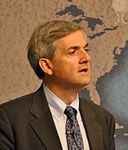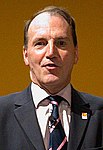Liberal Democrats leadership election, 2006
|
|
|||||||||||||||||||||||||||||||
|
|||||||||||||||||||||||||||||||
|
|||||||||||||||||||||||||||||||
|
|||||||||||||||||||||||||||||||
Sir Menzies Campbell
In the 2006 Liberal Democrats leadership election, Sir Menzies Campbell was elected to succeed Charles Kennedy as Leader of the Liberal Democrats, the third-largest political party in the United Kingdom.
On 5 January 2006, following a period of heavy speculation about both his leadership and his personal life, party leader Charles Kennedy called for a leadership contest to allow party members to decide if his leadership should continue. On 7 January 2006, following public pressure from many prominent Liberal Democrats to stand down, including twenty-five Members of Parliament who publicly announced they would refuse to serve on the party's frontbench if he did not stand aside, Kennedy announced that he would not be standing in the leadership election, resigning as party leader with immediate effect.
Four candidates declared their intention to stand: Campbell, then interim leader; home affairs spokesman Mark Oaten; the party's President, Simon Hughes; and treasury spokesman Chris Huhne. Oaten garnered little support from colleagues and withdrew from the contest, confessing two days later to a sexual relationship with a male prostitute. Nominations for the leadership closed on 25 January 2006, and Campbell was announced as the winner on 2 March 2006, having won 45 percent of the first preference votes cast. This rose to 58 percent when votes cast for third-placed Hughes were excluded and his voters' second preferences were counted.
Note: if non-transferable votes are discounted, the percentage of the vote won by Campbell was 57.9% and that won by Huhne was 42.1%. Simon Hughes's second preferences split as follows: Campbell 53.2%, Huhne 40.9%, non-transferable (i.e., no second preference given) 5.9%.
In the wake of the 2005 general election, Kennedy's leadership came under increased criticism from those who felt that the Liberal Democrats could have done even better at a time when, arguably, the Official Opposition, the Conservative Party, were in a relatively weak position and the Labour Government remained unpopular in the aftermath of the invasion of Iraq in 2003. Leadership speculation was renewed in later 2005. After the election of David Cameron as Leader of the Conservative Party in December 2005, it was widely reported that senior members of the Liberal Democrats had told Kennedy that he must either "raise his game" or resign.
...
Wikipedia



